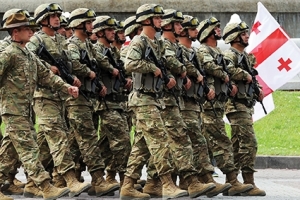Rattling the Sabre: Ogden on the Georgian Armed Forces
OPED
What with the parliamentary elections coming up and manifestos being thrown around like confetti, I've found it rather odd that so little emphasis has been placed on defense. Although NATO membership is being talked about a lot, little is being said about what the future of Georgia's Armed Forces might be, which seems odd to me since the two seem to go hand in hand.
NATO forces have helped Georgia train its own troops over the years, as well as building bases and training centers throughout the country as part of its jargon-laden packages that it gives to Tbilisi rather than anything meaningful like membership (it seems to me that there isn't anything substantial about the NATO Substantial Package, the projects it has initiated being similar to those it was doing on Georgian soil before the Package was granted). Yet despite continuing to praise Georgia for its military reforms (and its sacrifices when Georgian troops are killed on NATO missions) and help modernize Georgia's army, it strikes me as strange that little is being done to restructure the military.
Online information about the structure of the Georgian Army is limited, but the available information from the Internet and military friends of mine suggests a highly inflexible brigade model. Contrary to popular belief, during the 2008 war the Russians did not swarm Georgia with millions of troops and overwhelm the Georgian Army by sheer weight of numbers. Bad organization contributed to Georgia's defeat – fighting Russian regulars was clearly not as easy as South Ossetian militia, and Georgian troops were quickly driven out of Ossetia and then fled Gori without firing a shot. I'm not advocating last stands around the flag as a legitimate military tactic, but it is oddly out of touch with the much-vaunted Georgian patriotism and fighting spirit. It sounds trite, but the will to win is everything: ask any soldier. If you believe you’ll lose, you've already lost.
The Army has changed a great deal since 2008; a great number of its rank-and-file have combat experience from Afghanistan, and experience can make all the difference in combat (I still don't like the way the uniforms have been directly copied from the US Army, though). However, the Army's structure seems relatively unchanged. This may partly be to do with a lack of equipment or men (although the Georgian Army has far more equipment than it is usually given credit for), but I can't fathom why NATO and the Georgian MoD have not drawn more attention to this.
A Western military brigade contains everything it needs to engage an enemy force, whether it be made up of infantry, armoured vehicles, air assets, or everything together. A brigade might be centred around one particularly corps (such as tanks, or light infantry) but it will still be capable of going up against almost any type of hostile unit. Georgian brigades, however, are centred around one corps; infantry brigades seem to contain only infantry, while artillery brigades only have heavy guns etc. To my civilian readers, imagine being given a bowl of rice and only a knife to eat it with; a different tool for a different job.
I have it on the authority of a friend of mine who's a junior officer in the Georgian Army that should Georgian infantrymen need support from combat engineers or artillery, they have to call for assistance from bases some distance away; not overly useful if the country is ever invaded and attacked again and Georgia finds itself facing a multitude of threats. Georgia's light infantry units have apparently served well in Afghanistan, but since the Taliban do not field tanks or air assets, Georgia's brigade structure was not an issue, especially as Georgian contributions to NATO deployments make use of NATO combat support arms.
Another war with Russia looks to be highly unlikely for the time being, but if NATO really does want to improve Georgia's self-defense capabilities, it might start with the basics rather than just throwing equipment and training teams at Tbilisi. Russian sabre rattling over the Baltic States and military adventurism in Ukraine and Syria should convince even the most sceptical that even if the threat is not immediate, it is ever present.
Tim Ogden












